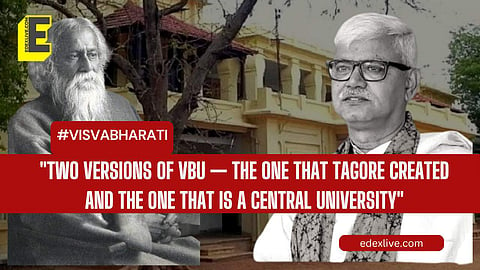

“I thought in Tagore’s Rajar rajottye, amra shobai raja (In the kingdom of our king, we are all Kings). The song resonates with the values that were ONCE at the heart of Visva-Bharati University (VBU),” says Dr Kaushik Bhattacharya, with a strong emphasis on the word 'once'. “But in (Vice-Chancellor Bidyut) Chakraborty’s ‘kingdom’, he acts as the sole ‘Raja’ (ruler) of the institute, subjecting employees and students to constant harassment and victimisation," alleges the professor.
Today, May 9, on the 163rd birth anniversary of Rabindranath Tagore, Professor Kaushik laments the erosion of the university’s former self in the light of the recent turmoil it has been going through — embroiled in a rising number of legal cases, terminating professors on flimsy grounds and issuing suspension orders against vocal students.
All of this, as per Professor Kaushik, his colleagues and students, harks back to the fact that VBU has come far away from what Tagore envisioned it to be. Now, they say that the central university has become a battleground, with dissenting voices being silenced and the “kingdom of the king” losing its idealistic lustre.
A peek into the past would tell us how the verdant trees would shelter eager students while professors carried out classes under its shade — a sublime metaphor for how education wasn't boxed inside a classroom and was instead free-flowing and open, with the varsity providing the much-needed environment for this to thrive.
These are the very ideals that VBU's Founder Rabindranath Tagore was a staunch advocate of. But once a bastion of creativity, culture and intellectual freedom, does the varsity stand for the same ideals which inspired its founder? Professors and students raise some serious allegations.
Looking at the varsity now: Amartya Sen vs VBU
Shantiniketan, famously known as Tagore's "Abode of Peace", is currently in the fifth day of one of its biggest protests in support of Nobel Laureate Amartya Sen amidst his land dispute with VBU authorities.
According to VBU, Sen has been allegedly occupying 13 decimals of the land of the university in an unauthorised manner. On the other hand, Sen has vehemently denied the allegations and maintained that while VBU had leased 1.25 acres of land to his father for a specific period, the contentious 13 decimals of land were purchased by his father, and he possesses all the necessary documents to prove the same.
Called for protest by CM Mamata Banerjee herself, today, approximately two thousand protesters turned to art and music as their weapons, celebrating and in solidarity on what is Tagore's birth anniversary.
Amongst this massive assembly stand many notable personalities hailing from various areas within Bengal's civil society, artists, activists, poets, and even Trinamool Congress (TMC) opposers; each united under one banner: solidarity with their Laureate, Amartya Sen.
This is just one of the many instances which depicts how the varsity has moved far away from the ideals it embodied. But what brought about this change? Professors and students speak to EdexLive to reflect on this change.
Since his arrival in 2001, Dr Kaushik Bhattacharya has been a prominent figure in the Philosophy Department at VBU and an active member of the Visva-Bharati Faculty Association (VBUFA). However, his recent transfer to the publishing department in Kolkata has left him feeling aggrieved, as he believes it was a retaliatory measure for his outspoken criticism of the vice-chancellor.
Bhattacharya alleges the current VC's actions are in stark contrast to the democratic values that VBU was founded upon, in accordance with Tagore's principles.
Fall in ranks
In addition to the ongoing turmoil, Dr Bhattacharya highlights several other issues that continue to afflict the institute. One of the most pressing concerns is the dramatic decline in VBU's position in the National Institutional Ranking Framework (NIRF), plummeting from a commendable 16 to a dismal 98, alongside a comparable drop in the National Assessment and Accreditation Council (NAAC) grading, which stands at B+ now. “Unfortunately, the VC's priorities do not include education or academics. This has had a visible impact on the institution, as evidenced by the ranking drop,” claims Bhattacharya.
To highlight the impact of VC’s actions on the university and its academic standing, the President of VBUFA, Dr Sudipta Bhattacharya, brings up the case of Dr Manas Maity, a star professor at the university. Dr Maity had brought tremendous esteem to VBU over the years, only to be suspended on unestablished grounds. Furthermore, the Department of Science and Technology (DST) was requested to cease funding his research. “Suspending a professor of international acclaim on flimsy grounds is unfathomable. How do you expect research to flourish?” asks Dr Sudipta Bhattacharya.
The two versions of VBU
Lately, the university has witnessed an upshot of conflicts between VC Bidyut Chakrabarty and his employees and students. Suspension orders and legal cases are at an all-time high. VBU is now involved in more than 100 legal cases involving several staff, employees and students.
"There are two versions of VBU — the one that Tagore created and the one that is a central university," says Prof Sudpta Bhattacharya, adding, "The central university has now taken the former in its grip, eating away at the essence of what Tagore's VBU stood for."
Despite VBU's official statement in its letter to CM Mamata Banerjee, choosing to follow the guidance of the Prime Minister, Tagore's influence remains deeply rooted within its community. This can be seen as they come together today to celebrate his birth anniversary.
Students, employees and others alike honour Tagore not only through artistic expression but also in acts of protest. Meenakshi Bhattacharya, a PhD student at VBU, expressed this sentiment when she stated that while the VC may adhere to the PM's 'margh-darshan', for those at VBU it is solely Tagore who serves as their beacon of guidance and inspiration.
